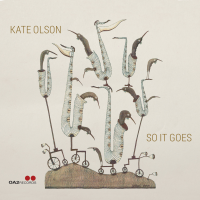Home » Jazz Musicians » Alvin Batiste
Alvin Batiste
A music master, composer, arranger, educator and performer - Alvin Batiste defies description. He is a Renaissance Man for the 21st Century. He is a Music Pioneer who has contributed to every genre. He is simply "Batiste" - one of the most distinctive and virtuosic of modern jazz clarinetists, and his name alone has become synonymous with taking the music to the next level and the next generation. Although sometimes called a "New Orleans clarinetist" (his Columbia album even billed him as a "Legendary Pioneer of Jazz"), in reality Alvin Batiste is an avant-garde player who does not fit easily into any classification. Under-recorded throughout his career, Alvin Batiste was a childhood friend of Ed Blackwell and he spent time in Los Angeles in 1956 playing with Ornette Coleman. Clarinetist and composer Batiste first received international attention after he appeared on two Julian Cannonball Adderly recordings. Batiste has just completed the musical score to Vu-Dou Macbeth an Operatic choreo-drama by librettist Lenwood O’Sloan. Batiste performs throughout American Inner city school districts using the principles in his book entitled: The Root Progression System: The Fundamentals of African American Music. Receiving numerous awards and honors during his career that has spanned more than five decades, His work has won him Fellowships from the National Endowment for the Humanities and the Louisiana Division of the Arts, the National Association of Jazz Educators’ National Humanitarian Award, the International Association of Jazz Educator’s Lifetime Achievement Award, Offbeat Magazine’s Lifetime Achievement Award for Arts Education, the Louis A. Martinet Legal Society’s Education Award and Southern University’s Distinguished Service Award. Batiste is also holder of the Louisiana Governor's 2005 Award for "Outstanding Contribution to Arts Education." His students are presently very prominent in the world of music today as celebrated jazz musicians, composers, recording artists and educators. A limited list includes Randy Jackson, Antonio York, Roland Guerin, Troy Davis, Donald Edwards, George Fontenette, Herman Jackson, Henry Butler, Branford Marsalis, Kent Jordan, Chris Severan, Willie Singleton, Herlin Riley, Reginald Veal, Kent Jordan, Yolanda Robertson Windsay, Ernest Jackson, Margeret Valet, Jonathan Bloom, Coco York, Wes Anderson, Julius Farmer, Dennis Nelson, Kirk Ford, Al Rodriguez, Charlie Singleton, Monty Seward, Betsy Braud, Micheal Ward, Raymond Harris, John Gray, Quamon Fowler, Maurice Brown, and many more. Batiste is currently the lead teacher in jazz instrumental music at the New Orleans Center for the Creative Arts (NOCCA). He holds a Master’s degree of Music in clarinet performance and composition from Louisiana State University and a Bachelor’s degree in Music Education from Southern University.
Read moreTags
Alvin Batiste

by Elliott Simon
A preeminent music educator and influential clarinetist, Alvin Batiste's impact will be with us as long as jazz is performed. From his founding and leadership of the Jazz Institute program at Southern University in Baton Rouge to his current work with the New Orleans Center for the Creative Arts, clarinetist Alvin Batiste has influenced three generations of musicians. His students are among today's most recognizable working jazz artists and with pianist Ellis Marsalis he keeps New Orleans' jazz birthright from ...
Continue ReadingAlvin Batiste - Marsalis Music Honors Series (2007)

Source:
Something Else!
By Nick DeRiso People think of clarinets as this sound from a different era, and the guys who play them as having done so in black and white. The late Alvin Batiste, who initially found his muse in Charlie Parker's “Now's the Time," was never that way. His isn't a same-ole, same-ole southland sound so much as a retro-fitted bebop update, with period instruments. Later, he dove into Sonny Stitt—and Batiste told me, a few years before his untimely passing, ...
read more
Alvin Batiste: Legendary Pioneer of Jazz

Source:
All About Jazz
NEW ORLEANS - Alvin Batiste's body will lie in state for public viewing at the historic Gallier Hall, 545 Saint Charles Avenue, New Orleans, Louisiana 70113 on Friday, May 11, 2007 from 12:00 noon to 7:00 pm, followed by a musical tribute where several New Orleans musicians will perform in memory of the man they called “Bat." Funeral service will be held at Gallier Hall, on Saturday, May 12, 2007 with public visitation from 9:00 am - 10:30 am. Final ...
read more
FITTING FAREWELL What was expected to be a joyous day in the life of legendary musician Alvin Batiste became one of remembrance by peers and admirers stunned by his sudden death. Monday, May 07, 2007 By Keith Spera The final day of the 2007 New Orleans Jazz and Heritage Festival celebrated the life and music of Alvin Batiste more poignantly than anyone imagined. The modern jazz clarinetist, composer and educator was scheduled to share a two-hour set Sunday with veteran drummer Bob French at the AT&T/WWOZ Jazz Tent. Special guests Branford Marsalis and Harry Connick Jr. would sit in as a tribute to Batiste and French, two musicians whose influence far outstripped their fame

































